
May 20
1860 Birth: Theodor Herzl: Founder of the modern Zionist movement:
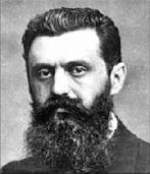
Theodor (Binyamin Ze'ev) Herzl, the visionary of Zionism, was born in Budapest in 1860. He was educated in the spirit of the German-Jewish Enlightenment of the period, learning to appreciate secular culture. In 1878 the family moved to Vienna, and in 1884 Herzl was awarded a doctorate of law from the University of Vienna. He became a writer, a playwright and a journalist, [the] Paris correspondent of the influential liberal Vienna newspaper Neue Freie Presse . . . .
Herzl first encountered the anti-Semitism that would shape his life and the fate of the Jews in the twentieth century while studying at the University of Vienna (1882). Later, during his stay in Paris as a journalist, he was brought face-to-face with the problem. At the time, he regarded the Jewish problem as a social issue and wrote a drama, The Ghetto (1894), in which assimilation and conversion are rejected as solutions. He hoped that The Ghetto would lead to debate and ultimately to a solution, based on mutual tolerance and respect between Christians and Jews.
In 1894, Captain Alfred Dreyfus, a Jewish officer in the French army, was unjustly accused of treason, mainly because of the prevailing anti-Semitic atmosphere. Herzl witnessed mobs shouting Death to the Jews in France, the home of the French Revolution, and resolved that there was only one solution: the mass immigration of Jews to a land that they could call their own. Thus, the Dreyfus Case became one of the determinants in the genesis of Political Zionism.
Herzl concluded that anti-Semitism was a stable and immutable factor in human society, which assimilation did not solve. He mulled over the idea of Jewish sovereignty, and, despite ridicule from Jewish leaders, published Der Judenstaat (The Jewish State, 1896). Herzl argued that the essence of the Jewish problem was not individual but national. He declared that the Jews could gain acceptance in the world only if they ceased being a national anomaly. The Jews are one people, he said, and their plight could be transformed into a positive force by the establishment of a Jewish state with the consent of the great powers. He saw the Jewish question as an international political question to be dealt with in the arena of international politics.
Herzl proposed a practical program for collecting funds from Jews around the world by a company to be owned by stockholders, which would work toward the practical realization of this goal. (This organization, when it was eventually formed, was called the Zionist Organization.) He saw the future state as a model social state, basing his ideas on the European model of the time, of a modern enlightened society. It would be neutral and peace-seeking, and of a secular nature. In his Zionist novel, Altneuland (Old New Land, 1902), Herzl pictured the future Jewish state as a socialist utopia. He envisioned a new society that was to rise in the Land of Israel on a cooperative basis utilizing science and technology in the development of the Land. He included detailed ideas about how he saw the future state's political structure, immigration, fund-raising, diplomatic relations, social laws and relations between religion and the state. In Altneuland, the Jewish state was foreseen as a pluralist, advanced society, a light unto the nations. This book had a great impact on the Jews of the time and became a symbol of the Zionist vision in the Land of Israel.
Herzl's ideas were met with enthusiasm by the Jewish masses in Eastern Europe, although Jewish leaders were less ardent. Herzl appealed to wealthy Jews such as Baron Hirsch and Baron Rothschild, to join the national Zionist movement, but in vain. He then appealed to the people, and the result was the convening of the First Zionist Congress in Basle, Switzerland, on August 29-31, 1897. The Congress was the first interterritorial gathering of Jews on a national and secular basis. Here the delegates adopted the Basle Program, the program of the Zionist movement, and declared, "Zionism seeks to establish a home for the Jewish people in Palestine secured under public law." At the Congress the World Zionist Organization was established as the political arm of the Jewish people, and Herzl was elected its first president. Herzl convened six Zionist Congresses between 1897 and 1902. It was here that the tools for Zionist activism were forged: Otzar Hityashvut Hayehudim, the Jewish National Fund and the movement's newspaper Die Welt. After the First Zionist Congress, the movement met yearly at an international Zionist Congress. In 1936, the center of the Zionist movement was transferred to Jerusalem.
Herzl saw the need for encouragement by the great powers of the aims of the Jewish people in the Land. Thus, he traveled to the Land of Israel and Istanbul in 1898 to meet with Kaiser Wilhelm II of Germany and the Sultan of the Ottoman Empire. The meeting with Wilhelm was a failure—the monarch dismissed Herzl's political entreaties with snide anti-Semitic remarks. When these efforts proved fruitless, he turned to Great Britain, and met with Joseph Chamberlain, the British colonial secretary and others. The only concrete offer he received from the British was the proposal of a Jewish autonomous region in east Africa, in Uganda . . . .
The 1903 Kishinev pogrom and the difficult state of Russian Jewry, witnessed firsthand by Herzl during a visit to Russia, had a profound effect on him. He requested that the Russian government assist the Zionist Movement to transfer Jews from Russia to Eretz Yisrael.
At the Sixth Zionist Congress (1903), Herzl proposed the British Uganda Program as a temporary refuge for Jews in Russia in immediate danger. While Herzl made it clear that this program would not affect the ultimate aim of Zionism, a Jewish entity in the Land of Israel, the proposal aroused a storm at the Congress and nearly led to a split in the Zionist movement. The Uganda Program was finally rejected by the Zionist movement at the Seventh Zionist Congress in 1905.
Herzl died in Vienna in 1904, of pneumonia and a weak heart overworked by his incessant efforts on behalf of Zionism. By then the movement had found its place on the world political map. In 1949, Herzl's remains were brought to Israel and reinterred on Mount Herzl in Jerusalem . . . .
Herzl coined the phrase If you will, it is no fairytale, which became the motto of the Zionist movement. Although at the time no one could have imagined it, Zionism led, only fifty years later, to the establishment of the independent State of Israel.
1886 Birth: John Jacob Astor: English journalist and chief proprietor of The Times (London)
1914 Volkishness: A letter from Arthur Strauss to Julius Ruettinger says that a Reichshammerbund group was founded in Munich that spring by Wilhelm Rohmeder, chairman of the Deutscher Schulverein and a member of the List Society since 1908. (THP)
1915 World War I: Various:
Battle of Festubert:
British, Canadian and Indian troops launch a new round of attacks against a reinforced German line around the village of Festubert, located in the Ypres Salient on the Western Front.
The Battle of Festubert formed part of the large-scale Artois Offensive spearheaded by Joseph Joffre, commander in chief of the French forces. Launched by British commander Sir Douglas Haig after pressure applied to the British Expeditionary Force (BEF) by Joffre, Festubert marked the BEF's second attack of the offensive, after a largely unsuccessful assault on May 9 at Neuve Chapelle.
[For further details, Click here]
List Regiment:

Gefreiter Adolf Hitler's 16 Reserve Infantry Regiment continues to occupy a position, at Fromelles (pictured above in a drawing by Hitler), which is on a level field with water channels, willow trees and willow stalks. In the distance towards the enemy lines lies an insignificant wood with barbed wire entanglements. Under the direction of their defense-minded commander, Lieutenant General Gustav Scanzoni von Lichtenfels, the regiment works ceaselessly day and night to further fortify their position at Fromelles while fighting off repeated assaults by the enemy. [For further details, Click here.]
Birth: Moshe Dayan: Israeli soldier and statesman.
1916 World War I: Various:
List Regiment: Gefreiter Adolf Hitler endures trench warfare in Flanders (Artois) with 3 Company, 16 Reserve Infantry Regiment [List Regiment]. [For further details, Click here.]
Alexei Petrovich Maresiev: Russian flying ace:
He started his flights as a fighter pilot in August 1941; he shot down 4 Nazi planes until April 1942, when his fighter plane was downed near Staraya Russa, then occupied by Germans. Despite being heavily injured, Alexei managed to return to the Soviet-controlled territory on his own. During his 18-day long journey, his injuries deteriorated so badly that both of his legs had to be amputated below the knee. Desperate to return to his fighter pilot career, he subjected himself to near a year of exercise to master the control of his prosthetic devices, and succeeded at that, returning to flying in June 1943. During one of the dog fights in August 1943 he downed 3 Nazi FW-190 fighters. In total, he completed 86 combat flights and shot down 11 Nazi warplanes. He was awarded a Golden Star of Hero of the Soviet Union, the highest military decoration in USSR. [For further details, Click here.]
1917 World War I: List Regiment:

Dispatch Runner Gefreiter Adolf Hitler serves at the front with 3 Company, 16 Bavarian Reserve Infantry Regiment at Arras. Over the next five days, the battle will sporadically draw to a close as the supply of material and men are consumed. Although the British are able to hold on to a few square miles of completely destroyed territory, the only achievement of the battle of Arras is "a fresh butcher's bill: 150,000 British casualties, 100,000 German." Hitler survives the battle unscathed and, the day after the heavy fighting ends, is shifted a few miles north to Artois. [For further details, Click here.]
1918 World War I: List Regiment: Gefreiter Adolf Hitler's 16th RIR is behind the lines for a period of rest that will last until May 30. [For further details, Click here.]
1920 Nazi Party: The Swastika: A right-handed (counterclockwise) swastika makes its first public appearance as the flag of the Nazi movement at the foundation meeting of the local Starnberg group. Hitler convinced Friedrich Krohn, who originally had proposed a left-handed design, to make the change. Krohn, however, is responsible for the color scheme of a black swastika in a white circle on a red background. (THP) [For further details, Click here.]
1927 Various:
Aviation: Spirit of St. Louis departs:
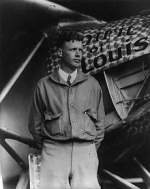
At 7:52 a.m., American aviator Charles A. Lindbergh takes off from Roosevelt Field on Long Island, New York, on the world's first solo, nonstop flight across the Atlantic Ocean and the first ever nonstop flight between New York to Paris. [For further details, Click here]
Saudi Arabia: By the Treaty of Jeddah, the United Kingdom recognized the sovereignty of King Ibn Saud over Hejaz and Nejd, which later merged to become Saudi Arabia.
1928 Weimar: General elections in Germany give the Nazi Party 3 percent of the vote. (THP)
1937 Holocaust: Professor von Verschuer—now at the University of Frankfurt—mentions in a letter to Professor Fischer his report for Rosenberg, Proposals for the Registration of Jews and Part-Jews. (THP):
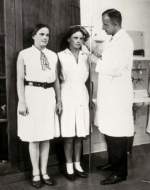
Von Verschuer [was] the Director of the Institute of Hereditary Biology and Race Biology at the University of Frankfurt, where he had become famous for his studies of genetic vs. environmental influences in twins. His assistant at the University of Frankfurt was Josef Mengele. [For further details, Click here]
1938 Czechoslovakia: Partial Mobilization ordered in response to Hitler's demands, and unrest in the Sudetenland.
1939 Various:
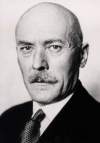
Soviet-German non-aggression pact negotiations: Memorandum by German Ambassador in the USSR (Schulenburg):
This afternoon at 4:00, I was received by the Chairman of the Council of People's Commissars and Commissar for Foreign Affairs Molotov. The interview took place in the Commissariat for Foreign Affairs. It lasted over an hour and was carried on in most friendly fashion. Herr Molotov, who speaks only Russian, had requested that no translator be brought along since he himself would provide an excellent interpreter. The latter, a rather young man, translated very correctly but slowly from the French. That explains in part the long duration of the conference.
I opened the conversation by saying to Herr Molotov that the last proposals of Herr Mikoyan in our economic negotiations had presented several difficulties which could not be immediately removed. We now believed that a way had been found to come to an understanding and we intended in the very near future to send Geheimrat Dr. Schnurre to Moscow to discuss with Herr Mikoyan whether an agreement could be reached on the basis of our proposals. I asked whether Herr Mikoyan was prepared to confer with Herr Schnurre. Herr Molotov replied that the course of our last economic negotiations had given the Soviet Government the impression that we had not been in earnest in the matter and we had only played at negotiating for political reasons. At first it had been reported that a German delegation was coming for economic negotiations to Moscow (I suggested that this report did not emanate from us but from the Polish and French press), and later it was to the effect that Herr Schnurre was coming alone. Herr Schnurre did not come, but Herr Hilger and I had conducted the negotiations and then these negotiations also had faded out. The Soviet Government could only agree to a resumption of the negotiations if the necessary "political bases" for them had been constructed (wenn hierfur die notwendige "politische Grundlage" geschaflen sein werde.)
I told Herr Molotov that we had never regarded the economic discussions as a game, but we had always conducted them entirely in earnest. We always had and still have the sincerest intention to come to an agreement, and Berlin was of the opinion, if I understood it correctly, that a successful conclusion of the economic discussions would also help the political atmosphere. It had been technical reasons only that had been responsible for Herr Schnurre's absence and for the delay of the negotiations. The present economic conditions in Germany made it very difficult to fulfill the wishes of Herr Mikoyan.
I asked Herr Molotov what he meant by the construction of political bases. I had the impression that the German-Soviet atmosphere had improved during the last year or so, and I was astonished that economic negotiations should now be impossible while previously negotiations of the same sort had repeatedly taken place under more unfavorable Conditions and had been brought to a conclusion. Herr Molotov then declared that the way in which better political bases could be built was something that both Governments would have to think about. All of my determined efforts to bring Herr Molotov to make his wishes more definite and more concrete were in vain. Herr Molotov had apparently determined to say just so much and not a word more. He is known for this somewhat stubborn manner. I thereupon concluded the conversation and stated that I would inform my Government. Herr Molotov then bade me farewell in a very friendly fashion.
Immediately at the conclusion of my visit to Herr Molotov, I visited Herr Potemkin. I related to him the course of my conversation with the Chairman of the Council of People's Commissars, and I added that I had unfortunately not been able to find out from the conversation what Herr Molotov actually wanted. He certainly must have had something in mind. I asked Herr Potemkin to find out whether he could not possibly let me know what direction Herr Molotov's line of thought was taking. I gave the impression that I did not know at all what I should suggest to my Government. Nothing could be changed in the main lines of German policy. Thus, in my opinion, we would persevere in our East Asia policy. I could, however, add that this policy was in no way directed against the Soviet Union.
The Yankee Clipper takes off from Port Washington, New York, bound for Europe. The plane, the flagship of Pan American Airways, establishes the first regular air-passenger service across the Atlantic Ocean.
1940 World War II: Germans break through to English Channel at Abbeville:
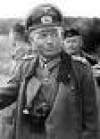
In reaching Abbeville, German armored columns, led by General Heinz Guderian (a tank expert), severed all communication between the British Expeditionary Force (BEF) in the north and the main French army in the south. He also cut off the Force from its supplies in the west. The Germans now faced the sea, England in sight. Winston Churchill was prepared for such a pass, having already made plans for the withdrawal of the BEF (the BEF was a home-based army force that went to northern France at the start of both World Wars in order to support the French armies) and having called on the British Admiralty to prepare "a large number of vessels" to cross over to France if necessary. With German tanks at the Channel, Churchill prepared for a possible invasion of England itself, approving a plan to put into place gun posts and barbed wire roadblocks to protect government offices in Whitehall as well as the prime minister's dwelling, 10 Downing Street.
1941 Various: World War II:
Crete: The Germans launch an airborne invasion. Of the first 3,500 German paratroopers dropped on the island, most are killed, but a second wave of 3,000 quickly captures key defenses and overwhelms the remaining British troops.
Holocaust: Emigration of Jews from all German-occupied territories including France banned by Hermann Goering, who makes one of the first official references to the "Final Solution" (Endloesung).
[See: How Widespread Was Guilty Knowledge of the Holocaust?]Rudolf Hess is transported from the Tower of London to Camp Z (Mytchett Place in Aldershot), which has been specially setup for his arrival with heavy security and bugging devices. (THP)
[See: Was Rudolf Hess 'Crazy'?]1942 World War II: Various:
Mr. Justice Singleton, a British High Court Judge, delivers a report to the British Cabinet: "If Russia can hold Germany on land I doubt whether Germany will stand 12 or 18 months� continuous, intensified and increased bombing, affecting, as it must, her war production, her power of resistance, her industries and her will to resist (by which I mean morale)."
Experiments: Eduard Milch to SS Obergruppenfuehrer Wolff:
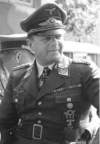
Dear Wolff (In German: Liebes Wolffchen)
In reference to your telegram of 12 May, our sanitary inspector reports to me that the altitude experiments carried out by the SS and Air Force at Dachau have been finished. Any continuation of these experiments seems not to be necessary. However, the carrying out of experiments of some other kind, in regard to perils on the high seas, would be important. These have been prepared in immediate agreement with the proper offices; Major Weltz (Medical Corps) will be charged with the execution and Captain Rascher (Medical Corps) will be made available until further orders, in addition to his duties within the Medical Corps of the Air Corps. A change of these measures does not appear necessary, and an enlargement of the task is not considered pressing at this time. The low-pressure chamber would not be needed for these low-temperature experiments. It is urgently needed at another place and therefore can no longer remain in Dachau. I convey the special thanks from the Supreme Commander of the Air Corps to the SS for their extensive cooperation. I remain with best wishes for you in good comradeship and with Heil Hitler!
Always yours, E. Milch.
1943 World War II: Various:

FDR to Stalin:
I know that the following American estimates of Axis losses in North Africa during the period December 8, 1940, to May 12, 1943, will be of interest to you:
1. Total personnel losses: 625,000.
2. Total plane losses (in North Africa and in the Mediterranean): 7,596 destroyed, 4,499 damaged. 3. Total tank losses: Not less than 2,100.
4. Total losses of merchant ships: 625 ships sunk (approximately 2,200,000 tons) and 371 ships damaged (approximately 1,600,000 tons).
5. Italian losses in East Africa: 150,000 (exclusive of natives).
Standing Order of the U-boat Command Number 511:
1. As far as accommodation facilities on board permit, captains and chief engineers of sunken ships are to be brought in. The enemy tries to thwart this intention and has issued the following order: (a) masters are not allowed to identify themselves when questioned, but should if possible use sailors selected especially for this purpose; (b) crew has to state that masters and chief engineers remained on board. If in spite of energetic questioning it is not possible to find the masters or the chief engineers, then other ships' officers should be taken aboard.
2. Masters and officers of neutral ships, which, according to Standing Order Number 101, can be sunk (for instance, Swedish ships outside Goteborg traffic), are not to be brought in because internment of these officers would violate international law.
3. In case ship officers cannot be taken prisoner, other white members of the crew should be taken along as far as accommodation facilities and further operations of the craft permit, for the purpose of interrogation for military and propaganda purposes.
4. In case of the sinking of a single cruising destroyer, corvette, or escort vessel, try at all costs to take prisoners, if that can be done without endangering the boat. Interrogation of the prisoners at transit camps . . . can produce valuable hints as to antisubmarine tactics, devices, and weapons used by the enemy; the same applies to air crews of shot-down planes.
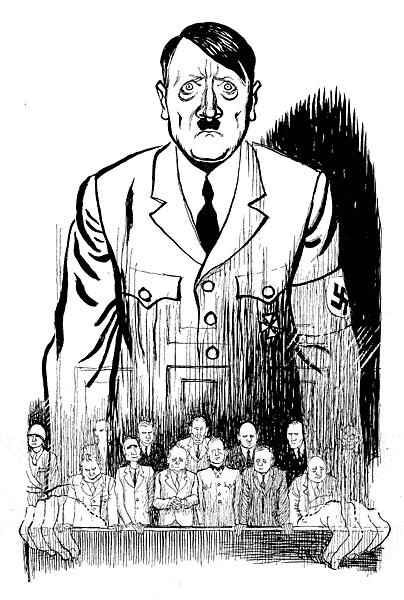
1946 Nuremberg Tribunal: Grand Admiral Erich Raeder testifies:
Colonel Pokrovsky: You will be shown where they can be found on the original, and you can say whether it was correctly read into the record and whether you acknowledge and confirm it. "My Attitude Towards Adolf Hitler and the Party. Disastrous influence on the fate of the German State . . . " [Note: This is a document written by Raeder in Moscow. Pokrovsky reads what Raeder wrote on Goering]:
"Unimaginable vanity and immeasurable ambition were his main peculiarities; running after popularity and showing off, untruthfulness, vagueness, and selfishness, which were not restrained for the sake of State or People. He was outstanding in his greed, wastefulness, and effeminate unsoldierly manner." Then, a little further on: "It is my conviction that Hitler very soon realized his character, but made use of him where it suited his purpose, and burdened him perpetually with new tasks in order to avoid his becoming dangerous to himself." On Page 24 of your document you give another characteristic; "The Fuehrer continued to attach importance to the fact that from the outside his relations to me seemed normal and good. He knew I was well thought of in all the really respectable circles of the German people, and that in general everybody had great faith in me. This cannot be said of Goering, von Ribbentrop, Dr. Goebbels, Himmler and Dr. Ley."
Raeder: But there is something missing. "In the same way, as for instance, Baron von Neurath, Count Schwerin van Krosigk, Schacht, Dorpmueller and others," who were on the other side.
Colonel Pokrovsky: Evidently it was not correctly translated to you. I will read this passage into the record. Now, on Page 27, this place is underlined in red pencil: "Doenitz' strong political inclination to the Party..."
The President: [Interposing.] I think the Tribunal could read this themselves if the defendant says that it is true that he wrote it. Probably Dr. Siemers could check it over and see that there are no inaccuracies.
Colonel Pokrovsky: Very well, My Lord. Then I shall have the opportunity to put a very brief question. [Turning to the defendant.] I will ask you to take a look at a place on Page 29, which is marked with pencil, where the paragraph deals with Field Marshal Keitel and General Jodl. Will you confirm that?
Raeder: What am I supposed to do? Yes, well...
Colonel Pokrovsky: I am asking you with regard to everything that I read into the record and what you say just now in this paragraph. I would like to have an answer from you. Do you confirm all that?
Dr Siemers: Mr. President, I quite agree with the suggestion by the Tribunal. However, I should like to ask that the entire document be submitted. I have only short excerpts before me, and I would be grateful if I could see the entire document. I assume that Colonel Pokrovsky agrees to that.
The President: Certainly, Dr. Siemers, one part of the document having been put in evidence, you can refer to the remainder of the document. You can put the remainder of the document in, if you want to.
Raeder: I said that at the time I tried to find an explanation for the cause of our collapse.
Colonel Pokrovsky: First, I ask you to give the answer, yes or no.
Raeder: Yes. On the whole, I agree entirely with this judgment. But I should like to add that I wrote those things under entirely different conditions. I do not wish to go into details, and I never expected that that would ever become public. These were notes for myself to help me form my judgment later on. I also want to ask especially that what I said about Generaloberst Jodl should also be read into the record, or where it belongs, that is, right after the statement about Field Marshal Keitel. With regard to Field Marshal Keitel, I should like to emphasize that I intended to convey that it was his manner towards the Fuehrer which made it possible for him to get along with him for a long time, because if anybody else had been in that position, who had a quarrel with the Fuehrer every day or every other day, then the work of the whole of the Armed Forces would have been impossible. That is the reason and the explanation of what I wanted to express by that statement. [For the full testimony, Click here.]
During his interrogation in Moscow, Raeder had unburdened himself of some of his feelings about his fellow leaders in the Wehrmacht; and his opinions were now read in court. 'Speer flattered Doenitz's vanity, and vice versa,' Raeder declared. 'Doenitz's strong political party inclination brought him difficulties as head of the navy. His last speech to the Hitler Youth, which was ridiculed in all circles, gave him in the navy the nickname of 'Hitlerbube Doenitz' (Hitlerboy Doenitz).' 'Keitel,' Raeder said, was 'a man of unimaginable weakness, who owes his long stay in his position to this characteristic. The Fuehrer could treat him as badly as he wished—he stood for it.' 'Goering,' Raeder asserted, 'had a disastrous effect on the fate of the German Reich. His main peculiarities were unimaginable vanity and unmeasurable ambition, running after popularity and showing off, untruthfulness, impracticality, and selfishness. He was outstanding in his greed, wastefulness, and soft unsoldierly manner.' Doenitz, who had to sit brushing shoulders with Raeder for another three months, exploded: 'A pissed-off jealous old man!' Keitel could not understand how Raeder could have dissembled respect and friendship for him through the years they had worked together, and was devastated by Raeder's statement. 'My defense has entered a new phase under wholly altered circumstances,' he (Raeder) enigmatically told his counsel, Otto Nelte, unrealistically failing to accept the fact that his defense had, for all practical purposes, been concluded. More than anything, these revelations, coming one by one, shattered the remnants of trust among the defendants—even those who maintained a semblance of unity wondered what each truly thought about the others.
1946 W.H. Auden becomes a U.S. citizen:
Auden, who was born in 1907 in England, had his first poem published in a collection called Public School Verse when he was 17. He entered Oxford the following year and befriended several men who became important intellectuals, including Cecil Day-Lewis and Christopher Asherwood. His friend Stephen Spender published Auden's first poetry collection in 1928, the year Auden graduated from Oxford. Two years later, Auden's second book, Poems, was published. Auden spent a year in Berlin, then worked for five years as a teacher in Scotland and England. He later worked for a government film bureau. In the 1930s, Auden's work was highly political. He embraced leftist causes and went to Spain intending to drive an ambulance during the Spanish Civil War. However, he was so appalled by the sacking of Roman Catholic churches that he returned to England. In 1935, he married Thomas Mann's daughter Erika, whom he had never met, to help her escape Nazi Germany. In 1936, he published On This Island.
In 1939, Auden moved to the U.S., and his work became less political as he turned to Christianity. During this time, he wrote such major works as Another Time (1940) and The Double Man (1941).
In 1948, Auden won the Pulitzer Prize for his long poem The Age of Anxiety (1947), which explores human isolation and spiritual emptiness in the modern city. In 1956, he accepted a position as professor of poetry at Oxford, back in England. He stayed at Oxford until 1960 and died in Austria in 1973. (History.com)
1947 Death: Philipp Lenard: Austrian physicist, Nobel Prize laureate for his research on cathode rays.
Lenard is most remembered today as a strong German nationalist who despised English physics, which he considered as having stolen their ideas from Germany. He joined the National Socialist Party before it became politically necessary or popular to do so. During the Nazi regime, he was the outspoken proponent of the idea that Germany should rely on "Deutsche Physik" ("Aryan physics") and ignore the (in his opinion) fallacious and perhaps deliberately misleading ideas of "Jewish physics", by which he meant chiefly the theories of Albert Einstein, including "the Jewish fraud" of relativity. An advisor to Adolf Hitler, Lenard became Chief of Aryan Physics under the Nazis. He was expelled from his post at the University of Heidelberg by Allied occupation forces in 1945.
1955 Cold War: From an NCS (National Security Council) Memorandum:
Considerable prestige and psychological benefits will accrue to the nation [that is first] successful in launching a satellite. The inference of such a demonstration of advanced technology, and its unmistakable relationship to intercontinental ballistic missile technology, might have important repercussions on the political determination of free world countries to resist Communist threats, especially if the USSR were to be the first to establish a satellite. Furthermore, a small scientific satellite will provide a test of the principle of "Freedom of Space." The implications of this principle are being studied within the Executive Branch. However, preliminary studies indicate that there is no obstacle under international law to the launching of such a satellite. [For further details, Click here.]
[See: Wunderwaffen: Hitler's Deception and the History of Rocketry.]1956 Cold War: United States drops Hydrogen Bomb over Bikini Atoll:
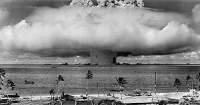
The United States conducts the first airborne test of an improved hydrogen bomb, dropping it from a plane over the tiny island of Namu in the Bikini Atoll in the Pacific Ocean. The successful test indicated that hydrogen bombs were viable airborne weapons and that the arms race had taken another giant leap forward.
The United States first detonated a hydrogen bomb in 1952 in the Marshall Islands, also in the Pacific. However, that bomb—and the others used in tests that followed—were large and unwieldy affairs that were exploded from the ground. The practical application of dropping the weapon over an enemy had been a mere theoretical possibility until the successful test in May 1956. The hydrogen bomb dropped over Bikini Atoll was carried by a B-52 bomber and released at an altitude of more than 50,000 feet. The device exploded at about 15,000 feet. This bomb was far more powerful than those previously tested and was estimated to be 15 megatons or larger (one megaton is roughly equivalent to 1 million tons of TNT). Observers said that the fireball caused by the explosion measured at least four miles in diameter and was brighter than the light from 500 suns.
The successful U.S. test meant that the ante in the nuclear arms race had been dramatically upped. The Soviets had tested their own hydrogen bomb in 1953, shortly after the first U.S. test in 1952. In November 1955, the Soviets had dropped a hydrogen bomb from an airplane in remote Siberia. Though much smaller and far less powerful (estimated at about 1.6 megatons) than the U.S. bomb dropped over Bikini, the Russian success spurred the Americans to rush ahead with the Bikini test.
The massive open-air blast in 1956 caused concerns among scientists and environmentalists about the effects of such testing on human and animal life. During the coming years, a growing movement in the United States and elsewhere began to push for a ban on open-air atomic testing. The Limited Test Ban Treaty, signed in 1963 by the United States, the Soviet Union, and Great Britain, prohibited open-air and underwater nuclear testing. (History.com)
1998 Frank Sinatra is laid to rest:

Sinatra did not serve in the military during World War II. On December 11, 1943, he was classified 4-F ("Registrant not acceptable for military service") for a perforated eardrum by his draft board. Additionally, an FBI report on Sinatra, released in 1998, showed that the doctors had also written that he was a "neurotic" and "not acceptable material from a psychiatric standpoint". This was omitted from his record to avoid "undue unpleasantness for both the selectee and the induction service".
Active-duty servicemen, like journalist William Manchester, said of Sinatra, "I think Frank Sinatra was the most hated man of World War II, much more than Hitler", because Sinatra was back home making all of that money and being shown in photographs surrounded by beautiful women.
[For further details, Click here]
Edited by Levi Bookin (Copy editor)
levi.bookin@gmail.com



Click to join 3rdReichStudies


Disclaimer: This site includes diverse and controversial materials—such as excerpts from the writings of racists and anti-Semites—so that its readers can learn the nature and extent of hate and anti-Semitic discourse. It is our sincere belief that only the informed citizen can prevail over the ignorance of Racialist "thought." Far from approving these writings, this site condemns racism in all of its forms and manifestations.
Fair Use Notice: This site may contain copyrighted material the use of which has not always been specifically authorized by the copyright owner. We are making such material available in our efforts to advance understanding of historical, political, human rights, economic, democracy, scientific, environmental, and social justice issues, etc. We believe this constitutes a "fair use" of any such copyrighted material as provided for in section 107 of the US Copyright Law. In accordance with Title 17 U.S.C. Section 107, the material on this site is distributed without profit to those who have expressed a prior interest in receiving the included information for research and educational purposes. If you wish to use copyrighted material from this site for purposes of your own that go beyond 'fair use', you must obtain permission from the copyright owner.
Please Note: The list-owner and moderators of 3rdReichStudies are not responsible for, and do not necessarily approve of, the random ads placed on our pages by our web server. They are, unfortunately, the price one pays for a 'free' website.